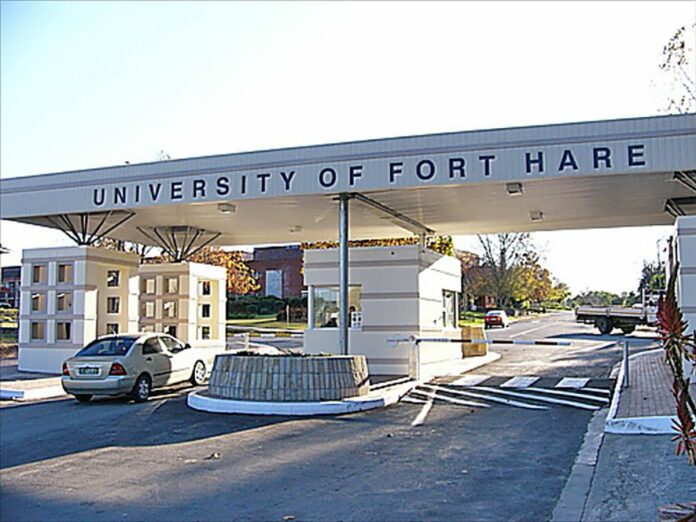The University of Fort Hare (UFH) has come out swinging against a series of allegations made by its Student Representative Council (SRC) President, Aphelele Khalakahla, accusing him of spreading falsehoods and misrepresenting the institution’s leadership and operations.
In a strongly worded statement, the university dismissed Khalakahla’s claims as “patently absurd” and “calculated to damage the good name and reputation of the University.”
The controversy began when Khalakahla disseminated letters to the Parliamentary Oversight Committee chair and the Minister of Higher Education, which Sunday World published. These letters, which painted a grim picture of the university’s state, have sparked a heated war of words between the SRC President and the institution’s leadership.
Khalakahla’s assertion that the University of Fort Hare is in a state of collapse was met with outright rejection. The university labeled the claim as “wholly without merit” and accused Khalakahla of advancing “falsehoods, distortions, and decontextualized allegations.”
“These claims are patently absurd,” said JP Roodt, Director of Marketing and Communications at UFH. “The University remains committed to its mission of academic excellence and student welfare. Mr. Khalakahla’s statements are not only misleading but also harmful to the reputation of this historic institution.”
Students under siege
Khalakahla also alleged that students at UFH are exposed to persistent crime, violence, and gender-based violence (GBV). However, the university countered this claim with statistics showing a significant decline in crime at its Alice campus.
“From January to June, crime incidents declined by 18%, thefts dropped by 27%, and burglaries were halved,” the statement read. The university also highlighted the success of its GBV Prevention and Gender Diversity Office, which reported a 71% drop in GBV incidents between April and May 2025.
“Mr. Khalakahla’s failure to familiarize himself with the facts before making harmful statements publicly constitutes a gross misrepresentation,” the university said.
Council inquorate
One of Khalakahla’s most serious allegations was that the UFH Council is operating unlawfully or as an interim body. The university dismissed this claim as “baseless and misleading,” asserting that all Council sittings have been “duly constituted and quorate.”
“Consistent with the position at several other South African universities, UFH is presently awaiting the formal appointment of additional Council members by the Department of Higher Education and Training (DHET),” the statement clarified.
Khalakahla also questioned the legality of the Vice-Chancellor’s term extension, a claim the university described as a “mistruth.” According to UFH, the extension was formally approved by the Council in October 2024 after being recommended by the Nomination and Governance Committee.
“The deliberations occurred within ordinary and quorate sittings of Council,” the university stated. “This process was transparent and in full compliance with governance protocols.”
Vacancies filled
Contrary to Khalakahla’s claim that critical leadership posts at UFH remain vacant, the university asserted that all senior leadership roles are filled.
“This assertion is false and emphatically denied,” the statement read.
Khalakahla’s claim that university-owned residences are uninhabitable and undignified was also strongly refuted. The university acknowledged isolated sewerage spills in May and June but emphasized that these were promptly addressed.
“Such claims are factually unfounded and materially misrepresent the University’s demonstrated commitment to student welfare,” said Roodt. “We continue to make substantial investments to address a four-decade infrastructure backlog.”
Sound finances
The SRC President’s allegations of financial mismanagement were described as “baseless” by the university, which pointed to its three consecutive unqualified audit opinions as evidence of sound financial governance.
“These opinions confirm consistent compliance with the highest standards of financial reporting and governance,” the statement noted.
Khalakahla also accused the university of failing to provide basic services like water and electricity and mismanaging budgets within the Student Affairs and Sports Department. The university countered these claims with detailed explanations.
A one-day water disruption in August was attributed to the district municipality’s cost recovery issues, while a power outage in June was the result of a billing dispute with Eskom, which was resolved in July.
“The University has invested R130 million in local water treatment works and continues to prioritize essential services for students,” the statement said.
On the budget front, the university emphasized that allocations for Student Affairs were made in accordance with its governance processes, with additional funding provided as needed.
In its closing remarks, the university called on Khalakahla to exercise responsible leadership and refrain from making unsubstantiated claims that could harm the institution’s reputation.
“UFH remains steadfast in its commitment to academic excellence, student welfare, and good governance,” said Roodt. “We urge all stakeholders, including the SRC, to work collaboratively in the best interests of the university community.”




